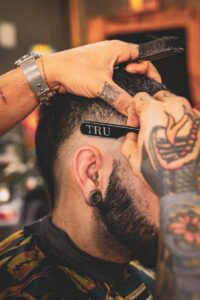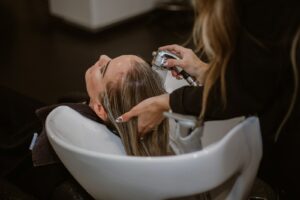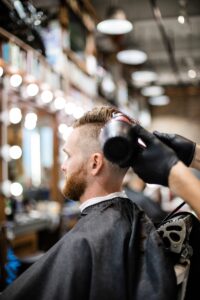Understanding the Differences Between Barbering and Cosmetology Licenses
In the dynamic world of personal grooming, the professions of barbering vs cosmetology are vital for enhancing individual style and appearance. While both fields are centered around beauty and self-care, they encompass distinct practices and educational pathways. Understanding the differences between barbering and cosmetology licenses is essential for anyone considering a career in this diverse industry.
Overview of Barbering vs Cosmetology
Barbering and cosmetology are two professions that cater to the beauty and grooming needs of clients. Barbering primarily focuses on cutting and styling hair, often utilizing tools like a straight razor for precise shaving. In contrast, cosmetology encompasses a broader range of services, including hair styling, nail care, and skincare. Both professions require specialized training and a license to practice, highlighting the importance of education in cosmetology and barbering.
What is Barbering?
Barbering is a specialized profession that emphasizes hair cutting, shaving, and grooming for men. Licensed barbers are trained to use various tools, including scissors and straight razors, to create stylish looks tailored to their clients’ preferences. The barbering program typically focuses on techniques specific to men’s haircuts and facial grooming, preparing barbers to work in a barbershop environment. Understanding the art of barbering involves mastering skills that are unique to this profession.
What is Cosmetology?
Cosmetology is a broader field that covers a variety of beauty services, including hair styling, manicures, and skincare treatments. A licensed cosmetologist has extensive training in various areas of beauty, equipping them with knowledge and skills to cater to diverse client needs. Cosmetology programs often include education in the latest trends, techniques, and products, allowing cosmetologists to work in a cosmetology salon or spa setting, providing comprehensive beauty care.
Key Roles of a Barber vs Cosmetologist
The key roles of barbers and cosmetologists differ significantly despite some overlap in services. Barbers specialize in cutting and styling hair, primarily for men, while cosmetologists provide a wider array of services, including hair coloring, skincare, and nail care. Understanding the difference between a barber and a cosmetologist can help clients choose the right professional based on their grooming needs. Additionally, some professionals may pursue a dual license, allowing them to offer both barbering and cosmetology services, thus expanding their career opportunities.

Photo by Agustin Fernandez on Unsplash
Licensing Requirements
Barber License: What You Need to Know
To become a licensed barber, individuals must complete a barbering program that meets state requirements and pass a licensing exam. The barbering program typically includes hands-on training in cutting, styling, and shaving techniques, along with theory related to hair care and hygiene. Once the education is completed, aspiring barbers must apply for their barber license through the state cosmetology board, ensuring they are equipped with the necessary knowledge and skills to succeed in a barbershop environment.
Cosmetology License: Requirements and Process
Obtaining a cosmetology license involves completing a comprehensive cosmetology program that covers various beauty services, such as hair styling, skin care, and nail care. After fulfilling the educational requirements, candidates must take a licensing exam that tests their practical skills and theoretical knowledge. A licensed cosmetologist is fully prepared to work in a cosmetology salon, providing a range of services that cater to the diverse needs of clients. Staying informed about state-specific requirements is essential for a smooth licensing process.
Differences in Licensing Exams
The licensing exams for barbers and cosmetologists differ significantly in focus and content. While barbering exams tend to concentrate on techniques specific to men’s grooming, including cutting and shaving with a straight razor, cosmetology exams assess a broader spectrum of skills, encompassing hair coloring, manicures, and skincare treatments. Understanding these differences is crucial for those pursuing careers in barbering and cosmetology, as it impacts the training needed to pass the respective licensing exams successfully.

Photo by Lindsay Cash on Unsplash
Barbering vs Cosmetology School
Curriculum Differences
The curriculum in cosmetology school and barbering school varies considerably, reflecting the distinct focus of each profession. Cosmetology programs cover a wide range of topics, from hair styling techniques to nail care and skincare treatments, preparing students for the diverse services they will offer as licensed cosmetologists. In contrast, barbering schools concentrate primarily on the art of cutting and styling hair, particularly for men, ensuring that students master essential barbering skills and knowledge required for a successful career.
Length of Training Programs
The length of training programs also differs between barbering and cosmetology schools. Typically, barbering programs are shorter, often ranging from 9 to 12 months, as they focus on specific skills necessary for obtaining a barber license. On the other hand, cosmetology programs may last anywhere from 12 to 24 months due to the extensive range of topics covered. This difference in program length reflects the depth of training required for each profession, ultimately shaping the career paths of aspiring barbers and cosmetologists.
Skills Acquired in Cosmetology School
Students attending cosmetology school acquire a diverse set of skills that enable them to perform various beauty services effectively. In addition to learning how to style hair, licensed cosmetologists gain expertise in facial treatments, manicures, and the latest trends in beauty. This extensive training allows cosmetologists to work in a variety of settings, including cosmetology salons and spas, where they can cater to clients seeking comprehensive beauty care. By mastering these skills, cosmetologists are well-equipped to meet the ever-changing needs of their clientele.

Photo by delfina pan on Unsplash
Career Paths and Opportunities
Working in a Barbershop
Working in a barbershop offers an array of opportunities for licensed barbers to specialize in grooming services tailored to men. Barbers can develop strong client relationships, providing personalized haircuts, shavings, and facial treatments. Many barbershops cultivate a unique atmosphere that fosters community engagement, allowing barbers to showcase their style and expertise. Additionally, barbers may participate in ongoing education, enhancing their skills in the latest barbering techniques.
Working in a Cosmetology Salon
Cosmetologists thrive in cosmetology salons, where they deliver a variety of services, including hair styling, nail care, and skincare treatments. The dynamic environment of a salon allows licensed cosmetologists to express their creativity while meeting diverse client needs. By staying updated on trends and techniques through continuous education, cosmetologists can elevate their service offerings, ensuring satisfied clients who return for various beauty services. This flexibility enhances job satisfaction and career longevity.
Specialization Opportunities
Both barbering and cosmetology offer numerous specialization opportunities, enabling professionals to refine their skills in specific areas. Barbers may choose to focus on advanced shaving techniques, beard grooming, or even hair coloring, while cosmetologists might specialize in fields such as skincare treatments, makeup artistry, or nail care. This specialization not only enhances the professional’s expertise but also attracts a broader clientele, making it essential for individuals to consider their interests when pursuing a career in barbering and cosmetology.
Conclusion: Choosing Between Barbering and Cosmetology
Factors to Consider
When deciding between a career as a barber or a cosmetologist, several factors must be considered. Personal interests, desired work environment, and the services one wishes to provide play a crucial role in this decision-making process. Additionally, examining the educational requirements and training duration can help aspiring professionals understand the commitment involved in obtaining a barber license or a cosmetology license. Evaluating these factors can lead to a fulfilling career path.
Making an Informed Decision
Making an informed decision between barbering and cosmetology requires thorough research and self-reflection. Aspiring barbers and cosmetologists should explore program offerings, visit schools, and, if possible, shadow professionals in both fields. Understanding the day-to-day responsibilities, potential earnings, and career growth opportunities will help individuals choose the right path. Ultimately, selecting a profession that aligns with personal passions and goals will lead to a more rewarding career.
Future Trends in Barbering and Cosmetology
The future of barbering and cosmetology is evolving, with trends in sustainability and technology reshaping the industry. Professionals are increasingly adopting eco-friendly products and techniques, catering to a growing clientele that values environmental responsibility. Additionally, advancements in technology, such as online booking systems and virtual consultations, are enhancing client experiences in salons and barbershops. Staying abreast of these trends will be crucial for barbers and cosmetologists looking to stay competitive in a rapidly changing market.
What is the main difference between a barber and a cosmetologist?
The main difference lies in the focus of their training and the services they offer. A barber typically specializes in men’s grooming, offering services such as haircuts, beard trims, and shaves, often using tools like the straight razor. On the other hand, a cosmetologist has a broader scope of practice that includes not only hair styling but also services like manicure, facial treatments, and nail care. Essentially, barbers and cosmetologists cater to different needs and demographics.
What types of services can I expect from a licensed barber?
A licensed barber specializes in a variety of grooming services primarily for men. These services include traditional and modern haircuts, shaving techniques, and beard grooming. The training in a barbering program equips them with the skills to use specific tools like the straight razor and to perform precise cuts and styles. Additionally, many barbers are trained in cosmetology services, allowing them to offer a well-rounded grooming experience.
What can I expect from a cosmetology program?
A cosmetology program is designed to provide a comprehensive education in various beauty services. Students learn about hair styling, skin care, manicure techniques, and nail care. The curriculum covers both practical skills and theoretical knowledge, ensuring that graduates are well-prepared to work in a cosmetology salon. Upon completion, they are eligible to take the licensing exam to become a licensed cosmetologist.
What is a dual license in the context of barbering and cosmetology?
A dual license allows an individual to practice both barbering and cosmetology, giving them the freedom to work in various settings, such as barbershops and cosmetology salons. This can be an advantageous path for those who want to offer a wider range of services and appeal to a broader clientele. Obtaining a dual license typically involves completing the required education and passing the relevant licensing exams for both fields.


